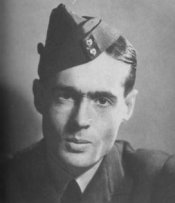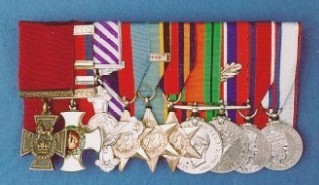
Group Captain Leonard Cheshire, VC was one of Britain’s most decorated bomber pilots


A little more than half a century ago, the first planes left Britain to begin a Bomber Offensive that would strike at the heart of Germany for nearly five years without remission. Undoubtedly, it was one of the most critical campaigns of the war, and one that is still wreathing in controversy.
That there should be continuing protests from some of the Germans who found themselves in the path of these devastating 1,000 bomber raids is perhaps no surprise. But as a pilot who played a small part, I find it sad that the criticism also seems to be gathering pace at home.
Worst of all are the persistent attempts to heap blame for the conduct of the campaign on the shoulders of Sir Arthur Harris.
Some critics object to plans to unveil a statue of Harris later this month. Others go further and actually accuse him of war crimes. He is depicted as a cold, hard man who deliberately bombed civilians. The mayor of Dresden claims that the bombing was militarily unjustified, while Neo–Nazis have gone much further, Using a modern form of Hitler's deceitful but powerful propaganda, and posing as a neutral group, they are arguing that the campaign he led has a moral equivalent with the worst excesses of Hitler's Germany. If the Nazi's were evil – and even this they do question – then we were equally, or even more so.
Harris, of course, is dead and unable to speak for himself. But this case for more generous treatment from a nation that he served with courage and selflessness remains unanswerable. Both on military and moral grounds. I hold that Harris was right. Remember that the plans for Bomber Offensive were drawn up in desperate times. In 1940, Europe was occupied with British Army defeated and the Royal Navy only just able to keep the Atlantic lifeline open.
With access to unlimited raw material, Hitler was not only accelerating his already vast war production, but was also building Europe into an impregnable fortress.
At all costs, the attack had to be carried to Germany and only bombers could do it. Our orders, then, were to hit only military targets, but hard though we tried, poor equipment, bad weather and heavy defences were too much for us. By January 1942 only two options lay open – to abandon the offensive or switch to area bombing. With the full agreement of the War Cabinet, and later the American, Winston Churchill decided that only a re–vitalised Bomber Offensive could prepare the way for the essential invasion of Europe.
He chose Harris for the job, and gave him full personal backing and a high priority in resources.
From that day, Harris devoted himself totally to the task. What I now find so extraordinary is that Churchill, the authoriser of the policy, should rightly be honoured as one of the towering figures of the century, while its instrument should find himself – even after death vilified and condemned. Harris was unique among commanders because he hardly ever saw or talked to the men who were carrying out his orders in the skies over Germany. Here began the myth that he was aloof and uncaring, but the simple fact is that Harris was too tied down to meet the crews of Bomber Command. Unlike other commanders land, sea or air, who would fight and then take time to regroup. Harris had a major battle to fight nearly every night.
For fully two years, with hardly a break longer than three nights, this man sent his forces into enemy territory and then sat up half the night waiting for them to return. Yet, within the first three months, he has won our complete confidence and even our affection. I met him several times and found him to be approachable and friendly. He was suspicious of new ideas but once convinced would give them his unstinting support.
Bomber Offensive caused massive disruption of Germany's war industry. It forced Hitler to recall huge numbers of troops and equipment from the frontline to the defence of Germany. As Hitler's Armaments Minister Albert Speer said:" It opened a second front long before the invasion of Europe. That front was the sky over Germany… the greatest lost battle on the German side."
Most crucially perhaps, the bombing forced the Luftwaffe to come up and fight. Their consequent losses were so great that when D–Day came, not a single German plane appeared over the Normandy beaches. Had there been, I don't believe the invasion could have succeeded. And without re–entry into Europe in 1944, one hardly dares think how many more lives would have been lost.
That is a military assessment of Harris's performance, but it also addresses the moral issue. For in my view, it was the lives saved by shortening the war that justified the policy of bombing. What else could one have done against such an adversary as Hitler?
It is significant that at the precise moment that Churchill and Harris were planning to step up the Bomber Offensive, Hitler and his closest aides were completing their plans for the Final Solution.
Twenty million people, a third of them Jews, would die in the concentration camps before the war ended. Averaged out, that means nearly 10,000 innocent people killed every single day for nearly six years of war, the rate accelerating as the Nazis saw the end approaching.
Given an evil such as this, the moral imperative clearly required an end to the killing in the shortest possible time and with minimum loss of life.
This was precisely the goal of Bomber Offensive, and even with hindsight no viable alternative has been proposed. Yes, we must love our enemies, but when faced with one group of people gunning down another, how else can one fulfil that duty?
To justify the Offensive is not to claim that we no mistakes, In a war of such magnitude, errors of judgement, from Command level to the bomb–aimer's seat, are inevitable. Ironically, the much–maligned Harris believed the bombing of Dresden to be a mistake. He voiced his objection to Churchill before the attack, but was overruled.
Harris was, beyond question, the right man for the unenviable task Churchill gave him. He deserves to be honoured, not reviled. His was a vital role in ending the fearful nightmare in which the greater part of the world had been so tragically trapped, the German people included.